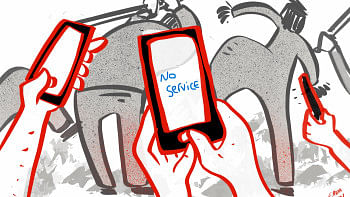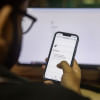The prolonged internet shutdown sets a dangerous precedent

The recent nationwide internet blackout in Bangladesh, beginning on July 18 and lasting over 150 hours, represents a grave threat to democracy and human rights that demands urgent attention. This unprecedented act of digital repression not only violated the fundamental rights of 170 million Bangladeshis but also set a dangerous precedent for authoritarian control in the digital age.
The shutdown occurred against a backdrop of mounting student protests, though the government initially attempted to obfuscate its role in the blackout. Officials, including ICT Minister Zunaid Ahmed Palak, first attributed the outage to security concerns, then to an arson attack on the cables in Mohakhali at nearby data centres by miscreants. Palak even suggested that broadband internet would be restored within a day. However, this explanation, or rather excuse, quickly crumbled under scrutiny. The truth, as confirmed by international observers like Cloudflare and Telenor, was that it was a deliberate, government-ordered shutdown.
Cloudflare, one of the world's largest cloud service companies, used global internet traffic monitoring tools to confirm that the blackout was indeed government-ordered. Telenor, the parent company of Grameenphone, corroborated this assessment, stating that local authorities had mandated the shutdown of 3G and 4G networks. The extent of the blackout is particularly troubling given Bangladesh's multiple internet connectivity options. The country has access to submarine cables through Bangladesh Submarine Cable Limited, land fibre connections through India, IIG VSAT connectivity for limited data links, and 3G/4G mobile networks. Put simply, the diverse infrastructure makes it implausible that a single localised issue could cause such widespread disruption, further supporting the assertion that this was a calculated move by authorities.
As internet access slowly returned after more than 150 hours, it came with draconian restrictions. Reportedly, the Bangladesh Telecommunication Regulatory Commission (BTRC) issued guidelines to International Internet Gateways (IIGs) that included mandatory deep packet inspection by the Department of Telecommunications, blocking of Facebook and related services, disabling caches, and limiting access to specific areas and institutions. This calculated move to sever digital communications coincided with student protests, revealing the shutdown's true intent. By denying citizens access to social media platforms, messaging apps, and news websites, the government effectively silenced the nation and prevented the outside world from witnessing what was happening inside Bangladesh.
When governments impose internet shutdowns and restrictions, particularly during protests, they hinder the flow of vital information to citizens. This includes preventing people from contacting emergency services like fire departments and healthcare providers. Moreover, these shutdowns impede international and local media outlets, as well as human rights organisations, from documenting potential human rights violations. Such violations may include killings or excessive use of force by law enforcement agencies. By cutting off communication channels, authorities effectively create an information blackout that compromises public safety and accountability.
Interestingly, amid the nationwide blackout, reports emerged that Augmedix, a US-based healthcare multinational corporation, maintained active internet access. This selective availability raises questions about the government's priorities and potential preferential treatment of certain entities.
The shutdown, however, is part of a disturbing global trend. In 2022, there were over 180 internet shutdowns across 35 countries worldwide. Governments increasingly deploy this tactic to cover up grave human rights violations, including state violence against peaceful protesters, electoral interference, extrajudicial killings of political dissidents, and arbitrary arrests and detentions.
The UN Human Rights Council, via establishing the Universal Declaration of Human Rights (UDHR), has unequivocally stated that internet shutdowns have "indiscriminate and disproportionate impacts on human rights." In today's interconnected world, internet access is essential for the realisation of numerous fundamental rights, including freedom of expression and access to information, the right to education, the right to health, the right to work, and freedom of assembly and association. By imposing this blackout, the Bangladesh government has effectively violated these rights for its entire population, contravening its obligations under international human rights law.
The shutdown's impact extends beyond civil liberties. In an increasingly digital economy, such disruptions can have severe economic consequences. Businesses relying on online transactions, e-commerce platforms, and digital communication tools suffer significant losses. The global nonprofit organisation NetBlocks estimates that the 150-hour shutdown could have cost Bangladesh's economy over USD 500 million, further burdening a nation already grappling with economic challenges.
Moreover, the blackout jeopardised public safety and health. During times of crisis, access to timely information can be a matter of life and death. Recounting my personal experience, doctors were not available to see outdoor patients at Birdem Hospital due to the ongoing nationwide curfew. However, online consultation and public health information also became inaccessible due to the internet shutdown. By cutting off internet access, the government potentially hindered emergency services, disrupted healthcare communications, and prevented citizens from accessing crucial public health information.
We and the world must respond accordingly to this flagrant violation of digital rights. The United Nations should launch an investigation into the shutdown and its human rights implications. International and development partners should insist on respect for digital rights and internet freedom. Tech companies and telecom providers operating in Bangladesh should publicly disclose any requests for government orders to shut down services. Civil society organisations should document the impact of the shutdown on human rights, the economy, and public services to build a case for accountability.
And lastly, the Bangladesh government must provide a full, transparent explanation for the shutdown, and implement legal safeguards to prevent future arbitrary internet restrictions.
The fight for internet freedom is synonymous with the struggle for human rights and democracy.
Mahiya Tabassum is a journalist at The Daily Star.
Views expressed in this article are the author's own.
Follow The Daily Star Opinion on Facebook for the latest opinions, commentaries and analyses by experts and professionals. To contribute your article or letter to The Daily Star Opinion, see our guidelines for submission.

 For all latest news, follow The Daily Star's Google News channel.
For all latest news, follow The Daily Star's Google News channel. 










Comments